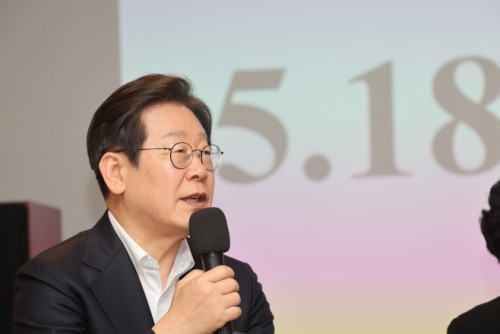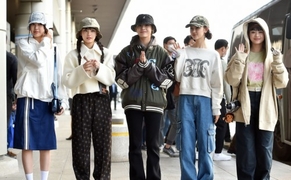 |
| Lee Jae-myung, a presidential primary candidate from the Democratic Party of Korea, speaks during a roundtable discussion themed "Citizens who led Korea’s democratization," held in Gwangju, on April 24. Participants included Kim Gil-ja, the mother of the late pro-democracy activist Moon Jae-hak; Kim Song-hee, a bereaved family member of a May 18 victim; and cultural critic Kang Yu-jung, who has called for President Yoon's impeachment. / Source: Yonhap News |
Democratic Party of Korea (DPK) presidential primary candidate Lee Jae-myung on April 25 unveiled a new set of agricultural policies aimed at transforming South Korea into a “K-agriculture powerhouse,” pledging to expand smart farming and strengthen social safety nets for farmers.
“Amid the climate crisis, agriculture is on the front lines of national security, safeguarding food sovereignty and sustaining national survival,” Lee wrote on Facebook. “We will make a grand transition in agricultural policy to enhance competitiveness, protect farmers’ livelihoods, and secure future growth engines for Korea.”
Citing frequent natural disasters, surging production costs, and growing instability in supply chains, Lee warned that agriculture’s sustainability is under threat. “Farming is no longer a declining industry,” he said. “It is a key strategic sector for food sovereignty and national security. The survival of rural areas—and the prevention of regional extinction—depends on revitalizing agriculture.”
Lee proposed five key strategies to revitalize the agricultural sector: providing compensation for agricultural disasters; expanding smart farming technologies; guaranteeing retirement and welfare support for aging farmers; increasing the agricultural budget and establishing a stable income safety net; and ensuring fair rice prices through reforms to the Grain Management Act.
He pledged to raise disaster recovery support rates and minimize insurance surcharges, saying, “We will ease the burden on farmers suffering from recurring heat waves, floods, pests, and livestock diseases.”
On smart agriculture, Lee emphasized boosting productivity through advanced technologies such as agricultural robots and artificial intelligence. He vowed to “establish a resilient smart farming system” and develop “customized smart farm models” for small-scale farmers.
To improve retirement security, Lee proposed a farmer retirement pension system modeled after the Yellow Umbrella Mutual Aid for small business owners. He also pledged to overhaul the “Farmland Transfer Retirement Direct Payment” scheme to better reflect current realities.
Lee called for an expansion of public direct payment programs and the rural basic income pilot system, starting in regions at risk of depopulation. He criticized the Yoon Suk-yeol administration for cutting the agriculture ministry’s budget, saying he would “restore its share to strengthen an advanced, stable income safety net for farming households.”
Finally, Lee vowed to revise the Grain Management Act to ensure fair rice prices and foster the agri-food sector as a future growth driver. “We’ll provide incentives and stable sales channels to encourage crop diversification,” he said.
Most Read
-
1
-
2
-
3
-
4
-
5
-
6
-
7





















